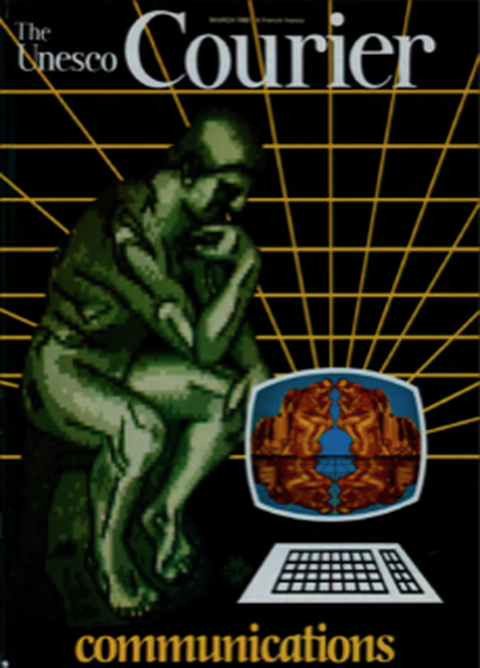Édouard Glissant & Cybernetics. Histories, Technologies, Practices of Being
Dissertation project by Nelly Y. Pinkrah

THE UNESCO Courier, Communications, March 1983, No. 3, ISSN 0304 - 3118
This doctoral project critically investigates the intersections of history, language, technology, and epistemology through the expansive oeuvre of Édouard Glissant, whose work remains underexplored within Media Studies. Central to this inquiry is the proposition that language is itself a constitutive technology – an embodied, material, and world-building force actively shaped by historical and material conditions. In an era increasingly mediated by machinic languages and algorithmic logics, this project reclaims language as fundamentally generative, resisting reductive instrumentalization and opening new relational possibilities.
Rather than subordinating disciplines to one another, the project cultivates a rigorous theoretical and conceptual dialogue between Black Studies, Media Theory, and Glissant’s relational poetics to challenge foundational assumptions and uncover connections across these fields. It mobilizes Glissantian concepts such as Relation, errantry, and Creolization to critically interrogate prevailing media-theoretical and historiographical paradigms. By foregrounding sonic, linguistic, and technological dimensions of Black and Caribbean cultural practices and histories (themselves always already mediated), the research compels Media Theory to grapple with historically embedded epistemologies, emphasizing relational complexity and technological mediation as key sites for theoretical innovation and conceptual expansion.
The framework of cybernetics serves as a critical site of exploration. Far from dismissing its insights, this project engages cybernetics as both a conceptual tool and an epistemological challenge because it offers powerful ways to think about complexity, contingency, and relationality, that resonate with Glissant’s poetics. At the same time, its universalizing ambitions and calculative logics risk reducing multiplicity to systems of control and optimization. This tension between the promise of cybernetics and its potential to constrain is central to understanding how contemporary technologies shape and delimit the possibilities of relationality, imagination, and collective action.
Methodologically, the project is structured around an intensive, genre-spanning engagement with Glissant’s corpus. Each chapter is aligned with a specific Glissantian genre, including his dramaturgy, theoretical essays, institutional/political writings, and poetry. Together with its structural elements this arrangement forms a carefully composed conceptual and methodological framework. The research thereby provides an original analytical model and substantially enriches interdisciplinary scholarship.
By placing Glissant’s work in dialogue with Media Theory, Black Studies, and cybernetics, this project challenges the reduction of language to information and explores its potential as technology. Language, as Glissant insists, is a site of possibility, a space where injustices are named and ruptured, and where the conditions for collective transformation take root. This project expands the scope of what is understood as technology and examines how it mediates power, constructs histories and epistemologies, and reconfigures our experience of relational life. Ultimately, it offers a critical and imaginative framework for navigating the entanglements of language, technology, and collective existence in the contemporary moment.
